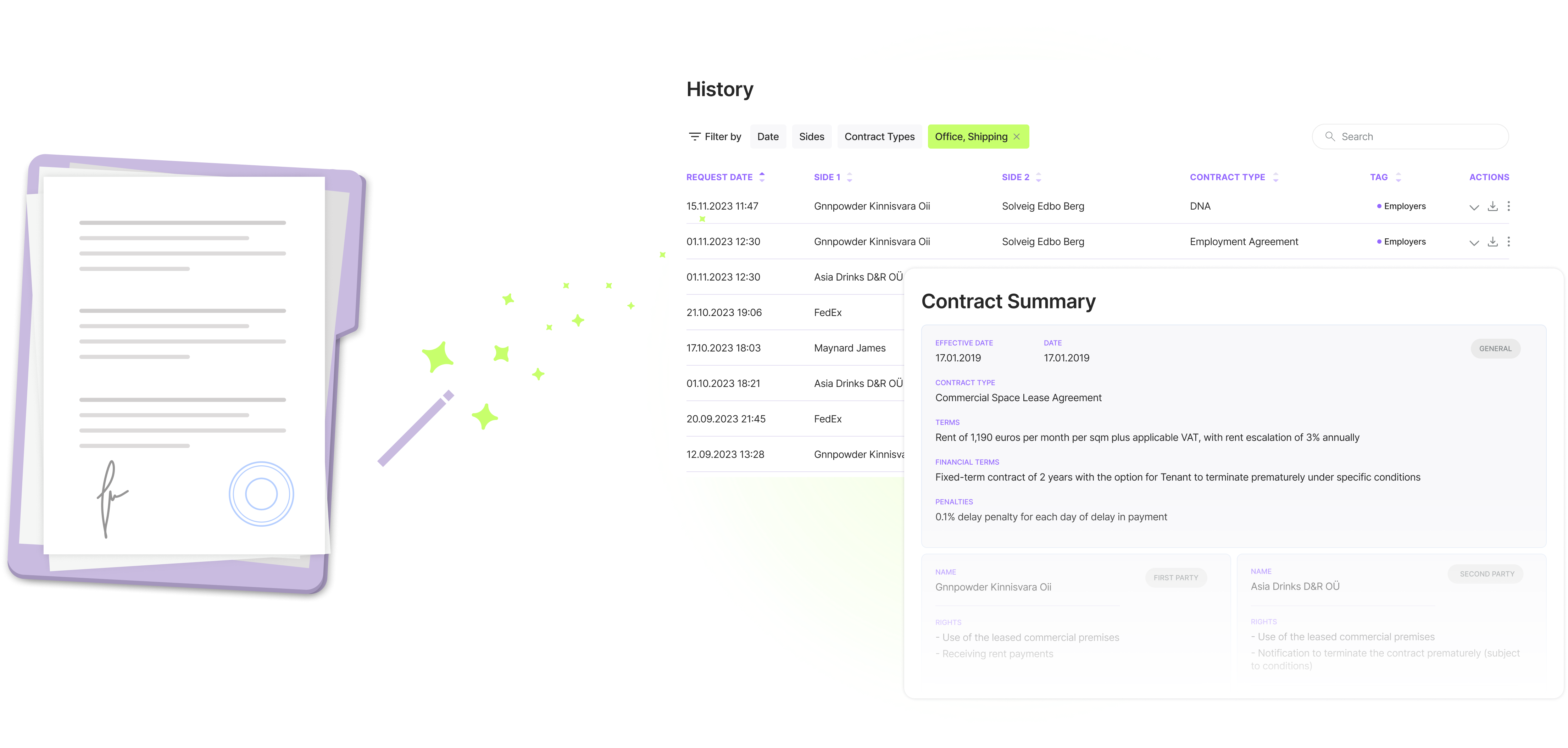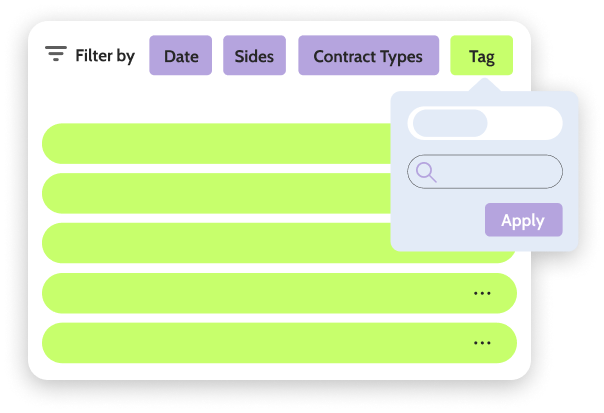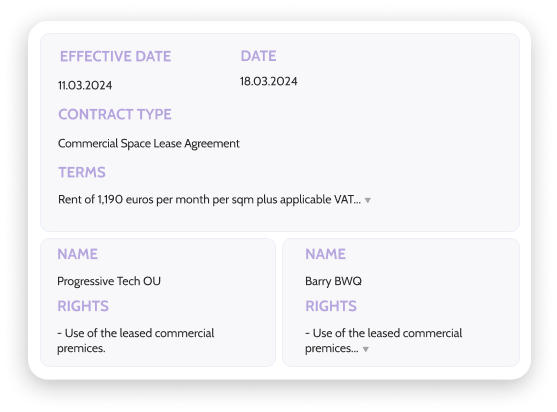


/contract
Document summarization and
review
Support .docx and .txt files
Complete document archive
Most popular!
/month
Document summarization and
review
Support .docx and .txt files
Complete document archive
Client services
/month
Document summarization and
review
Support .docx and .txt files
Complete document archive
Client services
Unlimited requests
/contract
1 document per cost
Summarization or AI Review
Support .docx and .txt files
Smart document archive
Most popular!
/month
120 documents
Summarize documents
Review documents
Support .docx and .txt files
Smart document archive
Customer support
/month
Unlimited documents
Summarize documents
Review documents
Support .docx and .txt files
Support .pdf files
Smart document archive
Premium customer support
For large teams and big challenges
/month
Document summarization and
review
Support .docx and .txt files
Support .pdf files
Complete document archive
Client services
Unlimited requests
Unlimited docsize
Complete privacy
Self hosted
Document summarization and
review
Support .docx and .txt files
Support .pdf files
Complete document archive
Premium Client services
Unlimited requests
Unlimited docsize
/month
Document summarization and
review
Support .docx and .txt files
Support .pdf files
Complete document archive
Client services
Unlimited requests
Unlimited docsize
Complete privacy
Self hosted
Document summarization and
review
Support .docx and .txt filess
Support .pdf files
Complete document archive
Premium Client services
Unlimited requests
Unlimited docsize
Vendor contract management refers to the systematic administration of agreements made with suppliers or service providers. This process encompasses the creation, execution, and analysis of contracts to maximize financial and operational performance while minimizing risk. Effective vendor contract management ensures that all parties adhere to the agreed terms and conditions, fostering a reliable and transparent business environment.
The primary goals of vendor contract management include ensuring compliance with contract terms, optimizing vendor performance, and minimizing risks related to vendor relationships. However, achieving these goals comes with several challenges:
By understanding these goals and challenges, businesses can implement strategies and tools to enhance their vendor contract management processes, ensuring better outcomes and stronger vendor partnerships.
Effective vendor contract management involves several critical stages, each essential for ensuring that contracts are well-structured and adhered to. These stages include:
A vendor contract management system can significantly streamline this process. Such systems provide a centralized repository for all contracts, making it easier to track and manage them throughout their lifecycle. Key features of a vendor contract management system include:
By leveraging a vendor contract management system, businesses can enhance the efficiency and effectiveness of their contract management processes, leading to better vendor relationships and reduced risk.
When selecting vendor contract management software, it’s important to consider features that will address your specific needs. Essential features include:
Here are some tips for choosing the best contract lifecycle management vendors:
By carefully selecting the right vendor contract management software, businesses can significantly improve their contract management processes, ensuring greater efficiency, compliance, and vendor performance.
A thorough review of vendor contracts is essential to ensure they are comprehensive and risk-free. Here are key elements to include in a vendor management contract review checklist:
Managing vendor relationships and contracts can be particularly challenging for small businesses with limited resources. Here are some practical tips to help manage these relationships effectively:
Adopting best practices in vendor contract management can greatly enhance efficiency, compliance, and overall vendor performance. Here are some industry best practices to consider:
Implementing these best practices can lead to several benefits, including:
By adopting these best practices, businesses can significantly improve their vendor contract management, leading to better outcomes and more efficient operations.
Effective vendor contract management is essential for maintaining smooth vendor relationships and ensuring compliance with contractual obligations. Key aspects include understanding the vendor contract management process, choosing the right software, conducting thorough contract reviews, negotiating effectively, and adopting best practices.
For businesses looking to streamline their vendor contract management processes, consider using ContractCrab. While this article focuses on general best practices and strategies, ContractCrab offers a comprehensive solution that can help manage contracts efficiently, ensuring compliance and fostering strong vendor relationships.
Contract Crab is an automated tool designed to extract key points and generate summaries from contracts and legal documents. While we strive for accuracy, the extracted information may not always be complete or error-free. Users should review and verify the extracted content for accuracy and completeness before relying on it.
Contract Crab does not provide legal advice or replace the need for professional legal consultation. The information extracted and provided by the service is for informational purposes only.
Users should consult with qualified legal professionals for specific legal guidance.
Users are responsible for the use of Contract Crab and any decisions made based on the extracted information.
Contract Crab and its creators are not liable for any consequences or damages resulting from the use of the service.
Contract Crab may process and store user data as necessary to provide its services. We are committed to protecting user data, but users should be aware of the privacy risks associated with uploading sensitive documents.
Contract Crab is an automated tool designed to extract key points and generate summaries from contracts and legal documents. While we strive for accuracy, the extracted information may not always be complete or error-free. Users should review and verify the extracted content for accuracy and completeness before relying on it.
Contract Crab does not provide legal advice or replace the need for professional legal consultation. The information extracted and provided by the service is for informational purposes only.
Users should consult with qualified legal professionals for specific legal guidance.
Users are responsible for the use of Contract Crab and any decisions made based on the extracted information.
Contract Crab and its creators are not liable for any consequences or damages resulting from the use of the service.
Contract Crab may process and store user data as necessary to provide its services. We are committed to protecting user data, but users should be aware of the privacy risks associated with uploading sensitive documents.